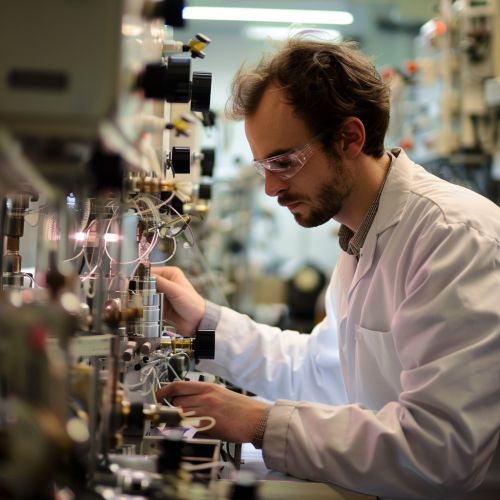Physicist
Introduction
A physicist is a scientist who specializes in the field of physics, which encompasses the study of matter, energy, and the fundamental forces of nature. Physicists seek to understand the behavior of the universe at both macroscopic and microscopic scales, from the motion of galaxies to the interactions of subatomic particles. This article delves into the roles, specializations, and contributions of physicists, providing a comprehensive overview of their work and its significance.
Historical Background
The history of physics dates back to ancient civilizations, where early thinkers like Aristotle and Archimedes laid the groundwork for classical mechanics. The scientific revolution of the 16th and 17th centuries, marked by the contributions of Galileo Galilei, Johannes Kepler, and Isaac Newton, transformed physics into a rigorous empirical science. Newton's laws of motion and universal gravitation were pivotal in shaping classical physics.
The 19th century saw the development of thermodynamics and electromagnetism, with key figures such as James Clerk Maxwell and Ludwig Boltzmann. The early 20th century ushered in the era of modern physics, characterized by the advent of quantum mechanics and relativity, pioneered by Albert Einstein, Niels Bohr, and Werner Heisenberg.
Areas of Specialization
Physicists often specialize in specific subfields, each with its own unique focus and methodologies. Some of the major areas of specialization include:
Theoretical Physics
Theoretical physicists develop mathematical models and abstractions to explain physical phenomena. They work on formulating theories that can predict the outcomes of experiments and observations. Key areas within theoretical physics include:
- **Quantum Mechanics**: The study of particles at the atomic and subatomic levels, governed by the principles of quantum theory.
- **Relativity**: The study of space, time, and gravity, primarily through Einstein's theory of relativity.
- **String Theory**: A theoretical framework that attempts to reconcile quantum mechanics and general relativity by positing that fundamental particles are one-dimensional "strings".
Experimental Physics
Experimental physicists design and conduct experiments to test hypotheses and validate theories. They often work with complex instruments and technologies to observe and measure physical phenomena. Key areas within experimental physics include:
- **Particle Physics**: The study of fundamental particles and their interactions, often conducted at particle accelerators like the Large Hadron Collider.
- **Condensed Matter Physics**: The study of the properties of matter in solid and liquid states, including phenomena like superconductivity and quantum Hall effect.
- **Nuclear Physics**: The study of atomic nuclei and their interactions, with applications in energy production and medical imaging.
Applied Physics
Applied physicists use principles of physics to develop new technologies and solve practical problems. Their work often overlaps with engineering and other applied sciences. Key areas within applied physics include:
- **Optics**: The study of light and its interactions with matter, leading to advancements in lasers, fiber optics, and imaging technologies.
- **Materials Science**: The study of the properties and applications of materials, including nanotechnology and semiconductors.
- **Medical Physics**: The application of physics to medicine, including the development of diagnostic tools like MRI and CT scans.
Contributions to Science and Technology
Physicists have made numerous contributions to science and technology, many of which have had profound impacts on society. Some notable contributions include:
- **Electromagnetism**: The unification of electricity and magnetism by James Clerk Maxwell, leading to the development of modern electrical and communication technologies.
- **Quantum Mechanics**: The development of quantum theory, which has revolutionized our understanding of atomic and subatomic processes and led to the invention of transistors and quantum computers.
- **Relativity**: Einstein's theories of special and general relativity, which have provided insights into the nature of space, time, and gravity, and have applications in GPS technology and cosmology.
- **Nuclear Physics**: The discovery of nuclear fission and fusion, leading to the development of nuclear power and advances in medical imaging and cancer treatment.
Education and Training
Becoming a physicist typically requires extensive education and training. The typical educational pathway includes:
- **Bachelor's Degree**: A four-year undergraduate degree in physics or a related field, providing a foundation in classical and modern physics, mathematics, and laboratory techniques.
- **Master's Degree**: A two-year graduate degree that allows for specialization in a particular area of physics and often involves research projects.
- **Doctoral Degree (Ph.D.)**: A research-intensive degree that typically takes 4-6 years to complete, culminating in a dissertation that contributes original knowledge to the field.
Many physicists also pursue postdoctoral research positions to gain additional experience and expertise before securing permanent academic or research positions.
Professional Organizations and Societies
Physicists often join professional organizations and societies that provide networking opportunities, resources, and support for their research and careers. Some prominent organizations include:
- **American Physical Society (APS)**: A leading organization for physicists in the United States, offering conferences, publications, and advocacy for the physics community.
- **Institute of Physics (IOP)**: A UK-based organization that promotes the advancement of physics and supports physicists through publications, events, and professional development.
- **European Physical Society (EPS)**: A federation of physical societies across Europe, fostering collaboration and communication among physicists.
Challenges and Future Directions
Physicists face numerous challenges as they push the boundaries of our understanding of the universe. Some of the key challenges and future directions in physics include:
- **Unification of Theories**: The ongoing quest to unify quantum mechanics and general relativity into a single coherent theory, often referred to as the search for a Theory of Everything.
- **Dark Matter and Dark Energy**: Understanding the nature of dark matter and dark energy, which constitute the majority of the universe's mass-energy content but remain largely mysterious.
- **Quantum Computing**: Developing practical and scalable quantum computers, which have the potential to revolutionize computing and solve problems that are currently intractable for classical computers.
- **Sustainable Energy**: Advancing technologies for sustainable energy production, including nuclear fusion and renewable energy sources, to address global energy needs and environmental challenges.
See Also
- Quantum Mechanics
- General Relativity
- Particle Physics
- Condensed Matter Physics
- Optics
- Materials Science
- Medical Physics
- Nuclear Physics
- Theory of Everything
- Dark Matter
- Quantum Computing
- Sustainable Energy
References


